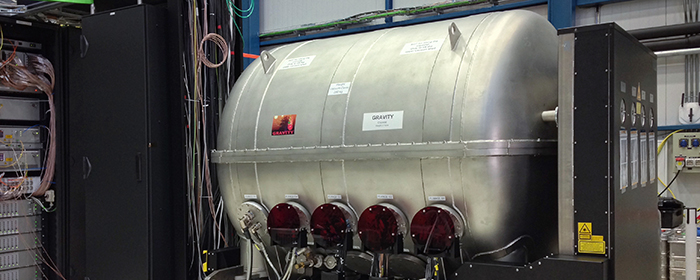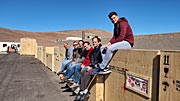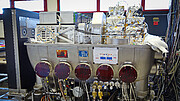Meddelelse
Stærk og følsom sonde til sorte huller ankommer til Paranal
Instrumentet VLTI GRAVITY er samlet og testet
11. august 2015
Det nye instrument med navnet GRAVITY er afsendt til Chile, og det er blevet afprøvet på Paranalobservatoriet.
GRAVITY er et andengenerationsinstrument til VLTs interferometer, og med det kan der måles positioner og bevægelser for astronomiske objekter i en detaljerigdom, som er meget bedre end hvad der er muligt indtil nu[1]. GRAVITY bliver også et kraftigt redskab til at studere de fineste strukturer i svagtlysende objekter, og det vil kunne fungere som spektrometer. I denne funktion kombineres de fire store teleskoper på Paranal, så de tilsammen fungerer som ét teleskop med en diameter på mere end 100 meter.
Det nye instrument vil forstærke mulighederne for at studere området nær det sorte hul i Mælkevejens centrum for ESOs VLT-teleskop. Eksistensen af et sort hul med en masse fire millioner gange større end Solens kan fastslås med sikkerhed. GRAVITY kommer også til at undersøge området omkring det sorte hul, hvor tyngdekraften er ekstremt kraftig. Også de flares; udbrud, som kommer fra området tæt ved det sorte hul, samt hullets spin og hældning vil kunne måles. Det vil endda måske være muligt at teste Einsteins generelle relativitetsteori i dette ekstreme miljø. Binære stjerners bevægelse, exoplaneter, skiverne omkring unge stjerner og billeder af overfladen af stjerner er det også muligt at studere med det nye instrument.
21. juli 2015 så holdet på Paranal "de første striber" fra GRAVITY med en testlyskilde, og konstaterede, at de nu kunne få samme resultater som i Garching før instrumentet blev afsendt. Senere i år bliver GRAVITY installeret på de fire 1,8 meter Auxiliary Telescopes, og afprøvet på astronomiske objekter. Det sker i november 2015, og en gang i første halvdel af 2016 bliver instrumentet så taget i brug ved de fire store VLT-teleskoper.
Udviklingen af GRAVITY er styret af Max Planck Institute for Extraterrestrial Physics, i Garching,Tyskland, og der er involveret seks institutter i alt fra forskellige steder i Europa[2], og tillige ESO. Instrumentet kan indsamle lys enten fra de fire VLTteleskoper eller fra støtteteleskoperne, the Auxiliary Telescopes. Det er i det nærinfrarøde område af spektret, at GRAVITY fungerer.
GRAVITY presser mulighederne for interferometri til det yderste. Instrumentet vil kunne måle de relative positioner for to astronomiske objekter med en nøjagtighed på 10 mikrosekunder. Det svarer til at kunne se, hvor meget et menneskehår vokser på eet sekund, på en afstand af 100 meter! Der vil også kunne tages billeder af svage objekter, som vil være langt mere detaljerede end hvad VLTI indtil nu har kunnet levere.
[1] I GRAVITY kombineres integreret lyslederoptik, infrarøde bølgefront-sensorer til adaptiv optik, "fringe tracking" og stabilisering med laserstråler, samt en ny metode til at kontrollere hele dette system.
[2] Partnerne i GRAVITYkonsortiet er:
- Max Planck Institute for Extraterrestrial Physics, Garching, Tyskland
- LESIA, Observatoire de Paris, Université Paris Diderot, Meudon, Frankrig
- Max Planck Institute for Astronomy, Heidelberg, Tyskland
- University of Cologne, Cologne, Tyskland
- Institut de Planétologie et d’Astrophysique de Grenoble (IPAG), Grenoble, Frankrig
- Laboratório de Sistemas, Instrumentação e Modelação em Ciências e Tecnologias do Ambiente e do Espaço (SIM), Lisbon and Porto, Portugal
- ESO, Garching, Tyskland
Links
Kontakter
ESON-Danmark
Ole J. Knudsen
Stellar Astrophysics Centre Aarhus Universitet
tlf 8715 5597 og 4059 4520
e-mail: eson-denmark@eso.org
Om meddelelsen
| Id: | ann15061 |
Our use of Cookies
We use cookies that are essential for accessing our websites and using our services. We also use cookies to analyse, measure and improve our websites’ performance, to enable content sharing via social media and to display media content hosted on third-party platforms.
ESO Cookies Policy
The European Organisation for Astronomical Research in the Southern Hemisphere (ESO) is the pre-eminent intergovernmental science and technology organisation in astronomy. It carries out an ambitious programme focused on the design, construction and operation of powerful ground-based observing facilities for astronomy.
This Cookies Policy is intended to provide clarity by outlining the cookies used on the ESO public websites, their functions, the options you have for controlling them, and the ways you can contact us for additional details.
What are cookies?
Cookies are small pieces of data stored on your device by websites you visit. They serve various purposes, such as remembering login credentials and preferences and enhance your browsing experience.
Categories of cookies we use
Essential cookies (always active): These cookies are strictly necessary for the proper functioning of our website. Without these cookies, the website cannot operate correctly, and certain services, such as logging in or accessing secure areas, may not be available; because they are essential for the website’s operation, they cannot be disabled.
Functional Cookies: These cookies enhance your browsing experience by enabling additional features and personalization, such as remembering your preferences and settings. While not strictly necessary for the website to function, they improve usability and convenience; these cookies are only placed if you provide your consent.
Analytics cookies: These cookies collect information about how visitors interact with our website, such as which pages are visited most often and how users navigate the site. This data helps us improve website performance, optimize content, and enhance the user experience; these cookies are only placed if you provide your consent. We use the following analytics cookies.
Matomo Cookies:
This website uses Matomo (formerly Piwik), an open source software which enables the statistical analysis of website visits. Matomo uses cookies (text files) which are saved on your computer and which allow us to analyze how you use our website. The website user information generated by the cookies will only be saved on the servers of our IT Department. We use this information to analyze www.eso.org visits and to prepare reports on website activities. These data will not be disclosed to third parties.
On behalf of ESO, Matomo will use this information for the purpose of evaluating your use of the website, compiling reports on website activity and providing other services relating to website activity and internet usage.
Matomo cookies settings:
Additional Third-party cookies on ESO websites: some of our pages display content from external providers, e.g. YouTube.
Such third-party services are outside of ESO control and may, at any time, change their terms of service, use of cookies, etc.
YouTube: Some videos on the ESO website are embedded from ESO’s official YouTube channel. We have enabled YouTube’s privacy-enhanced mode, meaning that no cookies are set unless the user actively clicks on the video to play it. Additionally, in this mode, YouTube does not store any personally identifiable cookie data for embedded video playbacks. For more details, please refer to YouTube’s embedding videos information page.
Cookies can also be classified based on the following elements.
Regarding the domain, there are:
- First-party cookies, set by the website you are currently visiting. They are stored by the same domain that you are browsing and are used to enhance your experience on that site;
- Third-party cookies, set by a domain other than the one you are currently visiting.
As for their duration, cookies can be:
- Browser-session cookies, which are deleted when the user closes the browser;
- Stored cookies, which stay on the user's device for a predetermined period of time.
How to manage cookies
Cookie settings: You can modify your cookie choices for the ESO webpages at any time by clicking on the link Cookie settings at the bottom of any page.
In your browser: If you wish to delete cookies or instruct your browser to delete or block cookies by default, please visit the help pages of your browser:
Please be aware that if you delete or decline cookies, certain functionalities of our website may be not be available and your browsing experience may be affected.
You can set most browsers to prevent any cookies being placed on your device, but you may then have to manually adjust some preferences every time you visit a site/page. And some services and functionalities may not work properly at all (e.g. profile logging-in, shop check out).
Updates to the ESO Cookies Policy
The ESO Cookies Policy may be subject to future updates, which will be made available on this page.
Additional information
For any queries related to cookies, please contact: pdprATesoDOTorg.
As ESO public webpages are managed by our Department of Communication, your questions will be dealt with the support of the said Department.




